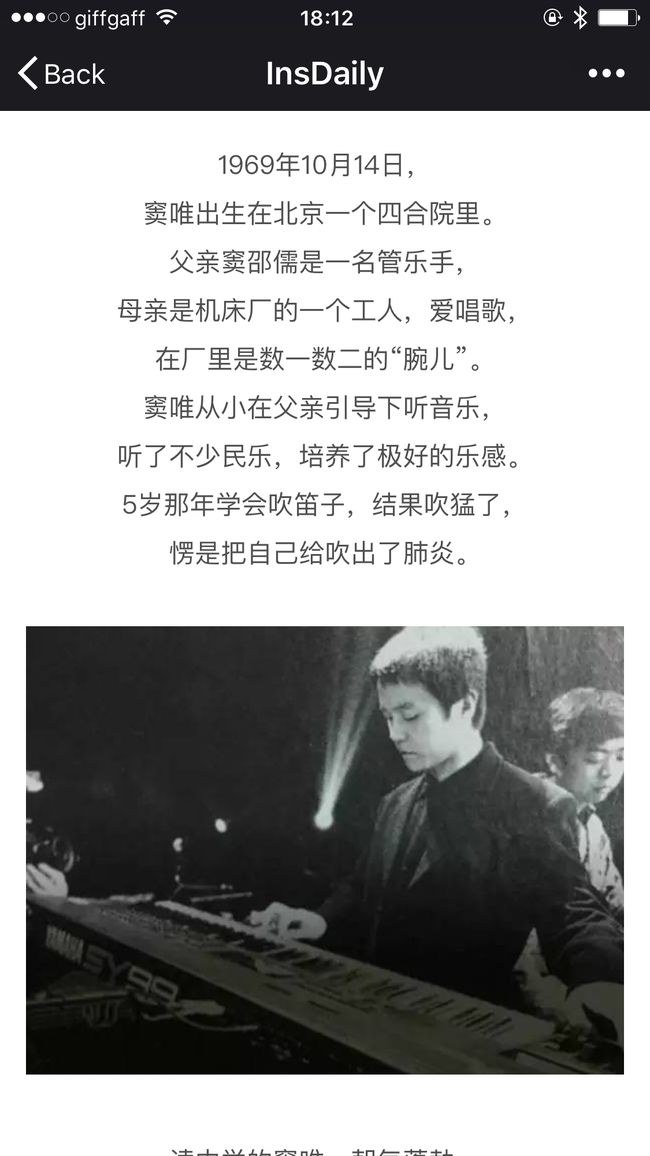字词与表达
the nuts and bolts (of something)
I have delved into the buts and bolts if what they do and how they do it.
the buts and bolts of something: the basic practical details of a subject or an activity 基本要点 (螺母与螺栓)
delve (v.)
delve into: to try hard to find out more information about something 探索、探究、考察
say
... there were almost certainly no selection pressures favoring people who could identify, say, the precise notes that a bird was singing.
say在这里的意思是for example。举例除了用for example, for instance, such as等,还可以用say。注意用法:前后各有一个逗号,类似于插入语的地位。
buy into
..., but they seldom buy into the idea that they have reached the peak of their fields because they were the lucky winners of some genetic lottery.
buy除了常见“买”的意思之外,我最熟悉的是"I don't buy it."中buy的用法,表示“相信”;还有"buy time",拖延时间。文中buy into是个短语,表示to believe something, especially that many other people believe in。随大流,盲从。
仿句练习:Please do not buy into the new leader and follow him immediately because we know nothing about him.
jump-start
Mozart is about to embark on a tour around Europe that will jump-start the Mozart legend.
初次阅读时,我把jump-start和head start弄混了。head start是不可数名词,表示起步前的优势。an advantage that sb. already has before they start doing something. 而jump-start是动词,表示全力以赴做某事:to put a lot of energy into starting on a process or an activity or into making it more quickly。和本句话中的embark on意思相近。PS:jump-start原本是指用搭线的方式发动汽车。
阅读感想
我是先抛弃文本听了一遍audiobook。声音质量很好,语速不快,一边做手边事一边听录音,先抓住了introduction部分的大意。然后翻开电子书开始阅读。个人认为这一章文字语言难度较小,以介绍背景信息和讲故事为主,目的在于使读者对于整本书的主题有基础认知,缓缓进入“context”。
说到讲故事,作者(们)举了三个例子,人物背景、发生时间和轨迹都有很大区别。
第一个是名人莫扎特,几百年来他一直被世人认为是“天才”,个人成长轨迹是从成功到极其成功最后到达令人叹为观止的高度。第二个是一些2岁到6岁智商能力等均正常的孩子,他们经过密集的培训和练习,在当代社会也掌握了在几个世纪前、被认为只有莫扎特这样的天才才能掌握的残暴技能。第三个是篮球队员Allen,此时故事已经跨出音乐领域走进竞技体育。与前两个例子不同的是,Allen had had his voiced heard in the story。很多人说他是天才,是老天赏饭吃。Allen说自己pissed off,因为这抹去了他每日艰苦训练的进步与成就。其中对于Allen年轻时并不擅长打球这段旧事的描述,对比尤其强烈,突出了本书主题“刻意练习”的重要作用。
大概也许可能是看得多想得多一些,对生活的观察力也会变得敏锐一点。就在看完这一章的时候,瞄到了一个关于窦唯的帖子,这段话就算是我内心补充的第四个故事吧。
我总觉得自己做什么事情似乎都没有天赋,国外做饭一年了,仍然不好吃。写论文,天天写进展也并不顺利。健身,更别提了——天生的体脂率高——我就是那种“瘦瘦的胖子”或者“胖胖的瘦子”。看到本书的前言时暗自庆幸,好在这个世界不全是gene说了算,让我这样的还能看到一丝希望。找到合适的方法和正确的方向,坚持不断地努力,第二天的自己总会比第一天好。这样,我就赢了。
最后,我想要跟读这本书的原因有二。一,non-fiction我最近读了三四本,略有心得,想要在读这本书的过程中检验真伪并提纯修正。二,八月我会比较忙,但我想看看自己到底能同时做多少事情,能不能高效学习,是否掌控得了自己的生活。希望自己扛得住,能够稳定输出。
大意归纳
Most of us ascribe extraordinary performers' success to their innate gift, calling them "the lucky few" and claiming "they are born with ...". However, scientific research in the past several decades has proved the real gift is to practice deliberately in order to really acquire some skill. It is a sort of "either use it or lose it" gift. Mozart was not a born musician; his father trained him from a very early age and gave his right and sufficient exposure. Ordinary children can also become able to identify the precise pitch through intense training and practice. Allen the basketball player was unnoticeable back in his middle school age, however, he has outperformed everyone in his team in the end—by shooting most everyday.
Genetic endowment does play a role in cultivating expertise, yet the ability to develop the expertise is the real gift. Human brains are highly adaptable and new connections can be built within the brain during deliberate practice. There is no preset limits or fixed potential. And potential, is to be created and developed not be reached. With regard to this, every one of us is born with the gift to become (amazingly) good at something.

